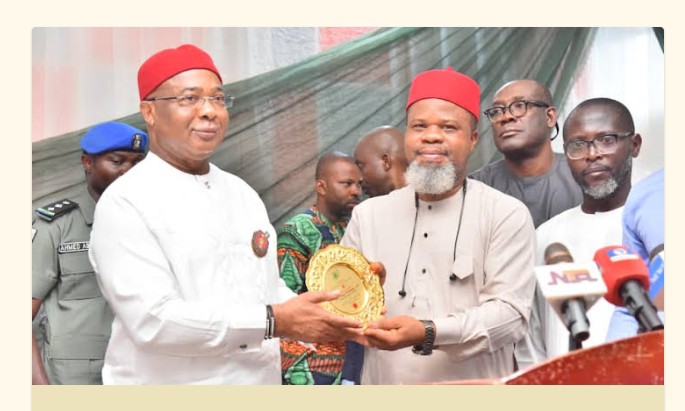
Governor Hope Uzodimma of Imo State has advised journalists in Nigeria to take steps to promote ethical reporting as well as the spread of disinformation in the course of discharging their duties.
Also, he has challenged them to use responsible journalism practice to hold those in positions of authority accountable and to promote democracy.
The suggestions were part of the remarks Governor Uzodimma made in his keynote address at the Nigeria Union of Journalists (NUJ) Triennial Conference in Owerri, the capital of Imo State, on Wednesday.
He said that responsible journalism practice is key to development of any society and helps in promoting healthy democratic experience in a country like Nigeria.
He frowned at the dangers which disinformation with its concomitant impact from fake news has caused both the larger society and the media sector, suggesting that it is high time journalists were exposed to different trainings that will equip them with the necessary skills to ethically practice their profession.
Governor Uzodimma brought to the fore how fake news has been used to undermine and malign the integrity of both the country, individuals and even the media, identifying it as a major threat to real journalism practice in our contemporary world.
He congratulated the leadership’s of the NUJ under Comrade Chris Isiguzo for the choice of Imo State for their Conference and urged the journalists to take advantage of their stay in Imo to see for themselves the developmental strides of his administration against what they may have been fed with on the social media as fake news.
He told the NUJ leadership that his government had taken steps to encourage their members in Imo State, reminding them that the idea is to ensure that he helps to bring out the best in them.
Governor Uzodimma’s speech reads:
“It is with profound pleasure that I welcome you all to Owerri for this triennial conference of the Nigeria Union of Journalists.
“Seeing this impressive gathering of journalists here today fills me with a sense of pride. It not only signifies your firm dedication to your profession but also validates the strides we have made in ensuring peace and progress in Imo State. Just a few weeks ago, we had the privilege of hosting the Nigerian Guild of Editors, and now, we are honoured to welcome the NUJ. This clearly shows that Imo State has truly returned to its rightful place as a safe and welcoming destination, the hospitality capital of the East.
“I want to express my sincere appreciation to the National President of the NUJ, Comrade Chris Isiguzo, and the Executive Council for choosing Imo State as the venue for this important conference. Comrade President, I know this gathering must feel like a homecoming for you, having launched your esteemed career right here in Imo State. Your leadership has been nothing short of transformative, not just in reforming the Union, but also in elevating the standards of professionalism in journalism.
“I commend you, Comrade Isiguzo, for your outstanding achievements and encourage you to continue supporting the incoming administration to ensure a smooth transition and continued progress.
“Now, the theme of this conference, Media and Democracy: The Journalist’s Role in Holding Leaders Accountable, couldn’t be more relevant. As UNESCO has rightly pointed out, journalism is the bedrock of democratic governance. A free and independent press is necessary for a healthy democracy. It provides a space for open debate, a reliable source of information, and a useful mechanism for holding those in power accountable.
“As we all know, the media plays a multifaceted role in shaping public opinion, encouraging civic engagement, and promoting transparency in government. Nevertheless, Free Press Unlimited has identified four key functions of the media in society, and I think they are worth reiterating:
1) Providing reliable information: In today’s world, where information overload and misinformation are rampant, journalists must be symbols of truth. You must diligently verify facts and provide accurate and unbiased reporting. It is this commitment to truth that builds public trust.
2) Acting as a watchdog: Journalists must be the eyes and ears of the people. They must scrutinise the actions of those in power, fearlessly expose corruption, and hold leaders accountable for their decisions. This watchdog role is important for preventing abuses of power and ensuring that the government truly serves the people.
3) Facilitating democratic discourse: The media must provide a neutral and inclusive platform for diverse voices and perspectives to be heard. It is through encouraging healthy debate and championing informed decision-making that you empower citizens to actively participate in the democratic process.
4) Reflecting society’s diversity: Journalists have a responsibility to reflect the rich diversity of our society, and to ensure that all voices, regardless of their background, are represented and given a platform. This commitment to inclusivity is the way to build a just and equitable society.

“Furthermore, research has consistently shown that a strong local press is particularly effective in holding leaders accountable to their constituents. This means that your work, especially at the grassroots level – what we sometimes call journalism for development or emancipatory journalism – will ensure that those in power remain responsive to the needs and aspirations of the people they represent









